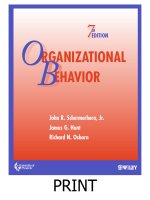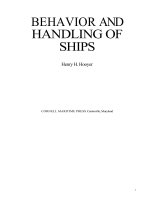preventing proplem behavior
Bạn đang xem bản rút gọn của tài liệu. Xem và tải ngay bản đầy đủ của tài liệu tại đây (3.64 MB, 566 trang )
2
Copyright © 2010 by Bob Algozzine, Ann P. Daunic, and
Stephen W. Smith.
First Skyhorse Publishing edition 2015.
All rights reserved. No part of this book may be reproduced in
any manner without the express written consent of the
publisher, except in the case of brief excerpts in critical
reviews or articles. All inquiries should be addressed to
Skyhorse Publishing, 307 West 36th Street, 11th Floor, New
York, NY 10018.
Skyhorse Publishing books may be purchased in bulk at
special discounts for sales promotion, corporate gifts, fundraising, or educational purposes. Special editions can also be
created to specifications. For details, contact the Special Sales
Department, Skyhorse Publishing, 307 West 36th Street, 11th
Floor,
New
York,
NY
10018
or
Skyhorse® and Skyhorse Publishing® are registered
trademarks of Skyhorse Publishing, Inc.®, a Delaware
corporation.
Visit our website at www.skyhorsepublishing.com.
10 9 8 7 6 5 4 3 2 1
Library of Congress Cataloging-in-Publication Data is
available on file.
Cover design by Karine Hovsepian
3
Print ISBN: 978-1-63220-563-6
Ebook ISBN: 978-1-63220-979-5
Printed in the United States of America
4
Contents
Acknowledgments
About the Authors
About the Contributors
Introduction: Changing the Lives of Students With Problems
1. Prevention Science and Practice
Bob Algozzine, Ann P. Daunic, and Stephen W. Smith
What We Know About Prevention Practice
What We Know About Response to Intervention
What We Know About Behavior and Achievement
An Illustration From Practice
2. Preschool Behavior Support
Bob Algozzine, Kate Algozzine, and Tina McClanahan
Importance of Teaching Social Skills in Preschool
Effective Practices for Teaching Social Skills to Young
Children
Teaching Young Children How to Behave in Social Settings
5
An Illustration From Practice
3. Schoolwide Positive Behavior Support
Ya-yu Lo, Bob Algozzine, Kate Algozzine, Rob Horner, and
George Sugai
Definition and Importance of SWPBS
Characteristics and Effective Practices of SWPBS
Effectiveness of SWPBS
Perspective on Schoolwide Positive Behavior Support
An Illustration From Practice
4. Cognitive-Behavioral Interventions in School Settings
Stephen W. Smith and Ann P. Daunic
Cognitive-Behavioral Interventions
Theoretical Underpinnings of CBI
Current Research on CBI
School-Based CBIs
A CBI Example
Summary
An Illustration From Practice
6
5. Social Skills Instruction and Generalization Strategies
Debra Kamps
Social Skills, Social Competence, and Curricula
Generalization of Social Skills and Building Performance
Competence
Why Social Skills Programs Sometimes Fail
Gaining Community Support for Social Skills Training
Importance of Improving and Generalizing Social Skills
6. Conflict Resolution, Peer Mediation, and Bullying
Prevention
Ann P. Daunic and Stephen W. Smith
Some Program Definitions
A Developmental Framework
Characteristics of Effective CRE Programs
How to Sustain CRE and Bullying Prevention Programs
Concluding Thoughts
An Illustration From Practice
7. Classroom Interventions and Individual Behavior Plans
7
Doug Cheney and Kelly Jewel
What Educators Should Know About the RTI Model
RTI as a Schoolwide and Classroom Management Approach
Effective Classroom Management Approaches
Tier II Behavior Plans for Students
Behavior Planning for Tier II Students
Summary of Tier II Behavior Planning
Individualized Behavior Intervention Plan (BIP)
Conclusion
8. Effective Home-School Partnerships
Hazel Jones
The Importance of Home-School Partnerships
Principles and Key Features of Home-School Partnerships
Characteristics of Effective Home-School Partnerships
Home-School Partnerships and Challenging Behavior
An Illustration From Practice
9. Community and Interagency Partnerships
8
Peter E. Leone and Robert Bartolotta
Poverty, Immigrant Status, and Risk
Interagency Approaches to Preventing Problem Behavior
Core Principles and Governance Structure
Linkages to Learning in Action
Evaluating the Effect of Linkages to Learning on Children
and Families
Preventing Problem Behaviors With Community Partnerships
10. Culturally Responsive Teaching
Festus E. Obiakor, Jeffrey P. Bakken, Cynthia Simpson, and
Bob Algozzine
Culture and Today’s Classrooms
Culturally Responsive Teaching
Teaching Appropriate Behavior
Teaching Behavior to CLD Learners
Conclusion
Illustrations From Practice
11. Monitoring Student Progress and Evaluating Prevention
Practices
9
Bob Algozzine and Kate Algozzine
Monitoring Student Progress in Preventive Interventions
Evaluating Outcomes of Prevention Efforts
Designing Program Evaluations
Measurement Issues
Common Hazards in Program Evaluation
Disseminating Evaluation Information
Measuring Success of Prevention Programs
12. Building and Sustaining Effective Prevention Practices
Ann P. Daunic, Stephen W. Smith, and Bob Algozzine
Building Effective Prevention Practices
Sustaining Effective Prevention Practices
Putting It All Together
Postscript
Bob Algozzine, Robert Putnam, and Rob Horner
Index
10
In memory of a cherished colleague and dear friend, Pam
Kay.
11
Acknowledgments
We gratefully acknowledge the contributions of the following
individuals:
Melody Aldrich, English Teacher
Florence High School
Florence, AZ
Renee Bernhardt, Special Education Facilitator
Cherokee County School District
Canton, GA
DaShonera E. Griffin, Assistant Professor of Exceptional
Education
School of Education
Clark Atlanta University
Atlanta, GA
Michael Humphrey, Assistant Professor
Department of Special Education and Early Childhood
Studies
Boise State University
12
Boise, ID
Jane Hunn, Middle-Level Science Teacher
Tippecanoe Valley Middle School
Akron, IN
Erin Jones, Special Education Teacher
Tea Area Elementary School
Tea, SD
Sally Koczan, Science Teacher
Meramec Elementary School
Clayton, MO
Alison Martins, Special Education Teacher
Seven Hills Charter Public School
Worcester, MA
Gregory A. O’Connell, Facilitator/Assistant Principal
Cedar Rapids Community Schools/Grant Wood Elementary
School
Cedar Rapids, IA
Cathy Patterson, Elementary Learning Specialist
13
www.Ebook777.com
Walnut Valley Unified School District
Walnut, CA
Laura Peterson, Special Education Teacher
Center School
Nashoba Regional School District
Stow, MA
Diane P. Smith, School Counselor
Port Allegany, PA
Deborah D. Therriault, Special Education Teacher POHI/EI
Clarkston Community Schools
Clarkston, MI
Marta Turner, Staff Development Coordinator
Northwest Regional Education Service District
Hillsboro, OR
14
About the Authors
Bob Algozzine is a Professor in the Department of
Educational Leadership at the University of North Carolina
and Project Codirector of the U.S. Department of Educationsupported Behavior and Reading Improvement Center. With
25 years of research experience and extensive firsthand
knowledge of teaching students classified as seriously
emotionally disturbed, Algozzine is a uniquely qualified staff
developer, conference speaker, and teacher of behavior
management and effective teaching courses. He is active in
special education practice as a partner and collaborator with
professionals in the Charlotte-Mecklenburg schools in North
Carolina and as an editor of several journals focused on
special education. Algozzine has written more than 250
manuscripts on special education topics, including many
books and textbooks on how to manage emotional and social
behavior problems.
Ann P. Daunic is an Associate Scholar in the
Department of Special Education, School Psychology, and
Early Childhood Studies at the University of Florida. For the
past 12 years, she has directed applied research projects
focused on the prevention of problem behaviors through
school- and classroom-based interventions, including conflict
resolution, peer mediation, and instruction in social problem
15
solving. Her interest in preventive interventions for students
at risk for school failure reflects an academic background in
psychology and her experience as a college counselor for
economically and educationally disadvantaged students from
the New York City metropolitan area. She has also served as
a private high school administrator and guidance counselor,
collaborating with teachers and parents to address the social
and instructional needs of students with behavioral and
academic difficulties. She is currently Director of the
Prevention Research Project, a four-year study funded by the
Institute of Education Sciences to evaluate the efficacy of a
social problem-solving curriculum for fourth- and fifth-grade
students. Associated research interests include merging
social-emotional and academic learning and the role of social
cognition in the self-regulation of emotions and behavior.
Stephen W. Smith is a Professor in the Department
of Special Education at the University of Florida (UF). Prior
to receiving his PhD in Special Education from the University
of Kansas, he was a teacher of special education students for
eight years. Dr. Smith teaches graduate courses in the area of
emotional and behavioral disorders and research in special
education at UF and has conducted multiple federally funded
investigations of effective behavior management techniques,
including the study of social conflict and the effects of
schoolwide peer mediation programs. As the Principal
Investigator of a large-scale prevention science research grant
funded by the U.S. Department of Education, Institute of
Education Sciences (IES), Dr. Smith is investigating the
16
effects of a universal cognitive-behavioral intervention in the
form of a social problem-solving curriculum to reduce student
aggression and chronic classroom disruption. He has
presented his findings and recommendations at numerous
state, regional, national, and international professional
conferences. While at UF, Dr. Smith has received three
teaching awards and a University Research Award, and he has
served twice as a UF Research Foundation Professor. He is a
member of the IES Social and Behavioral Education
Scientific Research Review Panel and is a member of the
Executive Board of the Division for Research, Council for
Exceptional Children.
17
About the Contributors
Kate Algozzine is currently working as a consultant with the
National Center for Research on Early Childhood Education
(NCRECE) Professional Development Study. She recently
was a Research Associate and Coordinator of School-Wide
Behavior Intervention for the Behavior and Reading
Improvement Center at the University of North Carolina at
Charlotte. She has been a general education and special
education classroom teacher and college instructor for more
than 30 years in public and private schools and universities in
Florida and North Carolina. Educational materials that she
has published are used in teacher preparation courses around
the country. She has been a featured speaker at local, state,
national, and international professional conferences and is
widely recognized as an expert on effective Schoolwide
Behavior Intervention.
Jeffrey P. Bakken, PhD, is Professor and Chair of the
Department of Special Education at Illinois State University.
He has a bachelor’s degree in Elementary Education from the
University of Wisconsin—LaCrosse and graduate degrees in
the area of Special Education—Learning Disabilities from
Purdue University. Dr. Bakken is a teacher, consultant, and
scholar. His specific areas of interest include transition,
teacher effectiveness, assessment, learning strategies, and
technology. He has written more than 80 academic
publications, including a book, journal articles, chapters,
monographs, reports, and proceedings; and he has made over
190 presentations at local, state, regional, national, and
international levels. Dr. Bakken has received the College of
Education and the University Research Initiative Award, the
18
College of Education Outstanding College Researcher Award,
the College of Education Outstanding College Teacher
Award, and the Outstanding University Teacher Award from
Illinois State University. Additionally, he is on the editorial
boards of many scholarly publications, including
Multicultural Learning and Teaching and Remedial and
Special Education. Recently, he was chosen as the Newsletter
Editor for the Council on Children with Behavioral Disorders.
Through his work, he has committed himself toward
improving teachers’ knowledge and techniques, as well as
services for students with exceptionalities and their families.
Rob Bartolotta is a doctoral candidate in the University of
Maryland’s Department of Special Education. Previous to his
doctoral work, he taught in various restrictive settings,
including a residential treatment center, a regional alternative
educational program, and a juvenile detention facility. These
experiences have contributed to his research interest in
support programs for at-risk students and interventions
designed to facilitate their reintegration into less restrictive
settings.
Douglas Cheney, PhD, is Professor of Special Education at
the University of Washington— Seattle (UW), where he
teaches courses in classroom and behavior management,
functional
behavioral assessment, and social skills instruction. He has 35
years’ experience in special education and currently directs
the UW’s master’s program with a specialization in emotional
or behavioral disabilities (EBD). He also was Codirector of
UW’s doctoral training program in Positive Behavioral
Support (PBS) from 2000 to 2005. He is currently the
Principal Investigator at Washington’s Behavior Research
19
Center on Evidenced-Based Practices (federally funded) and
codirects Washington’s Positive Behavior Support Network.
The network provides training and evaluation to Washington
schools implementing PBS.
Dr. Cheney is Coeditor of The Journal of Emotional and
Behavioral Disorders, an Associate Editor for Intervention in
the School and Clinic, and a Consulting Editor for Behavioral
Disorders and Beyond Behavior. He cochaired Washington’s
Statewide Task Force on Behavioral Disorders from 1997 to
1999, which provided a blueprint for the state’s Positive
Behavior Support Network, and he is a Past President
(1998–1999) of the International Council for Children with
Behavioral Disorders. He was Director of the Institute on
Emotional Disturbance at Keene State College, New
Hampshire, from 1992 to 1997, where he evaluated model
programs for students with emotional disturbance. Dr.
Cheney presents his research findings frequently at national
conferences and in publications and has had published
numerous articles and chapters on Positive Behavioral
Support for students with EBD and school and family
collaboration.
Rob Horner is the Alumni-Knight Endowed Professor of
Special Education at the University of Oregon, where he
directs the Educational and Community Supports research
unit. He received his undergraduate degree in Psychology
from Stanford University, his master’s in Experimental
Psychology from Washington State University, and his PhD
in Special Education from the University of Oregon. Dr.
Horner’s research has focused on developing evidence-based
interventions that result in socially significant changes for
people with and without disabilities. As Codirector with Dr.
20
George Sugai of the OSEP Technical Assistance Center on
Positive Behavioral Interventions and Supports, Dr. Horner
coordinates research and technical assistance activities with
multiple partners across the nation. During the past 20 years,
he has worked directly with schools and school administrators
in the development of approaches for implementing
schoolwide systems of Positive Behavior Support. He has
been the editor of the Journal of the Association for Persons
with Severe Handicaps, coeditor of the Journal of Positive
Behavior Interventions, and associate editor for the Journal of
Applied Behavior Analysis and the American Journal on
Mental Retardation. In recognition of his achievements, Dr.
Horner has received multiple awards, among them the SABA
Public Service Behavior Analysis Award (2006), the AAMR
Education Award (2002), the TASH Positive Approaches
Award (2000), and the APA Fred Keller Educational
Research Award (1996).
Kelly Jewell, MEd, is a doctoral student in Special Education
at the University of Washington—Seattle (UW), where she is
focusing her studies on prevention research for students with
behavioral problems, as well as interventions for students
with emotional and/or behavioral disorders. She completed
her master’s degree at the University of Illinois in Emotional/
Behavioral Disorders as a Behavior Specialist. While at the
University of Illinois, she completed an internship with
Illinois’s Positive Behavior Interventions and Supports
Network.
Ms. Jewell taught public school for two years, with one of
those years in the Chicago Public Schools. Her classroom
experience included teaching high school students with
autism. Ms. Jewell is currently Vice President of the
21
www.Ebook777.com
Free ebooks ==> www.Ebook777.com
Association of Positive Behavior Supports student network.
She has presented at conferences focused on Positive
Behavioral Supports for students at risk or with emotional or
behavioral disabilities.
Hazel Jones is an Associate Professor in the Department of
Special Education, School Psychology, and Early Childhood
Studies at the University of Florida, where she teaches in the
Unified Early Childhood Program. Her work in the area of
families and collaboration includes coauthoring Interactive
Teaming: Enhancing Programs for Students With Special
Needs (4th edition) and coediting two monographs for the
Council for Exceptional Children, Division of Early
Childhood. These are Young Exceptional Children
Monograph No. 5: Family-Based Practices and Young
Exceptional Children Monograph No 6: Interdisciplinary
Teams.
Debra Kamps is a Senior Scientist with the Schiefelbusch
Institute for Life Span Studies at the University of Kansas,
Associate Director of Juniper Gardens Children’s Project, and
Director of the recently established Kansas Center for Autism
Research and Training. She has appointments in the
Departments of Applied Behavioral Science and Special
Education. Dr. Kamps has been a classroom teacher and
consultant in the area of autism, behavior disorders, and
school-based interventions for 30 years. Research and
professional interests include peer networks, social skills, and
behavioral interventions for children with autism and schoolbased academic, social, and behavioral interventions,
including classwide peer tutoring and classwide group
contingency programs for children at risk and with behavioral
disorders. Research has included longitudinal studies of
22
www.Ebook777.com
Free ebooks ==> www.Ebook777.com
prevention intervention for young children and multitiered
interventions, including Schoolwide Positive Behavior
Support and small-group intensive reading instruction in
elementary schools. She and collaborators recently completed
a five-year longitudinal, randomized trial for the Center for
Early Intervention in Reading and Behavior, a multisite
national project.
Peter E. Leone is a Professor in the Department of Special
Education at the University of Maryland, where he trains
teachers and conducts research in the area of behavior
disorders. During his professional career, he has taught
adolescents with behavioral disorders, monitored education
programs in juvenile and adult corrections, and studied
marginalized youth. A primary focus of his scholarship and
related activities is academic competence and entitlement of
adjudicated individuals with disabilities. His current research
interests include studying school-based referrals to police and
juvenile courts and the school life histories of incarcerated
youth.
Ya-yu Lo, PhD, is an Assistant Professor in the Department
of Special Education and Child Development at the
University of North Carolina at Charlotte. Dr. Lo’s research
interests include social skill instruction, Positive Behavior
Interventions and Supports, effective academic instruction,
challenging behavior, and behavioral disorders. Her current
research project, Peers as Social Skills Instruction Trainers
(PASSIT), funded by the Spencer Foundation, aims to
quantify the effects of a peer-directed, multimedia-integrated
social skills instruction program in which students at risk for
behavioral disorders serve as peer trainers. Dr. Lo has
coauthored 21 in-press or published articles, books, and book
23
www.Ebook777.com
Free ebooks ==> www.Ebook777.com
chapters and has made over 50 professional presentations at
the national/international, state/regional, or local/community
levels. She received the Council for Exceptional Children
Division for Research Early Career Publication Award in
2008 and was a recipient of the 2007 North Carolina
Association for Research in Education Distinguished Paper
Award. She is currently the Managing Editor of The Journal
of Special Education and the President-Elect of the North
Carolina Association for Behavior Analysis.
Tina McClanahan has worked for the Charlotte-Mecklenburg
Schools (CMS) in North Carolina since her graduation from
West Virginia State College. During her time with CMS, she
has held the positions of classroom teacher, literacy teacher,
Reading Recovery teacher, and K–2 Literacy Facilitator, and
she is currently a PreK Literacy Facilitator. She
also worked for the University of North Carolina at Charlotte’
s Behavior and Reading Improvement Center as a Center
Support Coordinator. She received National Board status in
2001 as an Early Childhood Generalist. She resides in
Matthews, North Carolina, with her husband and two
daughters.
Festus E. Obiakor, PhD, is a Professor in the Department of
Exceptional
Education
at
the
University
of
Wisconsin—Milwaukee. He is one of the leading scholars in
the fields of general and special education—he is the author
of more than 150 publications, including books and journal
articles. In his works, he is interested in reducing the
traditional misidentification, misassessment, miscatgorization,
misplacement, and misintruction of students who come from
culturally and linguistically diverse backgrounds. In addition,
he advocates a Comprehensive Support Model that takes
24
www.Ebook777.com
Free ebooks ==> www.Ebook777.com
advantage of the collaborative spirits of students, families,
schools, community members, and government agencies in
solving behavioral problems.
Robert F. Putnam, PhD, BCBA, is Senior Vice President of
School Consultation at the May Institute and was on the
faculty of the Harvard Medical School. He also serves as
Director of Consultation at the National Autism Center. Dr.
Putnam oversees one of eight national collaboration sites in
conjunction with the University of Oregon and the University
of Connecticut, comprising the National Technical Assistance
Center for Positive Behavior Interventions and Supports
funded by the Office of Special Education Programs, U.S.
Department of Education. Dr. Putnam received his PhD from
Boston College and currently serves on the faculty of
Northeastern University. His research interests are in the use
of function-based interventions to improve prosocial skills,
behavioral support strategies for individuals with autism
spectrum disorder, as well as Schoolwide Behavior Support
Interventions. He has published extensively and presents
regularly at national, regional, and local conferences on these
topics.
Cynthia Simpson, PhD, has more than 16 years of experience
in the public and private sector as a preschool teacher, special
education teacher, elementary teacher, educational
diagnostician, and administrator. She received her graduate
degree from Texas A&M University. She is currently an
Associate Professor and Special Education Program
Coordinator in the College of Education at Sam Houston
State University, where she teaches courses in cognitive
assessment and special education. Dr. Simpson maintains an
active role in the field of special education as an educational
25
www.Ebook777.com









